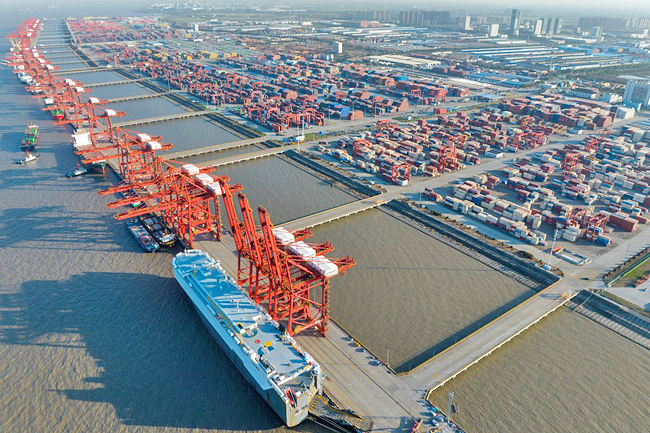BEIJING (XINHUA) – After a voyage of more than a month from Santos Port, Brazil, a cargo ship loaded with 68,000 tonnes of Brazilian corn arrived on January 7 at a port in south China’s Guangdong Province, marking the first batch of Brazilian corn imported in bulk ship into China.
Before that, Brazilian agricultural products like soya beans, chicken, and sugar entered China and gained popularity among Chinese consumers.
Brazilian beef, coffee, and propolis attracted many visitors to the fifth China International Import Expo (CIIE) last year.
China has been Brazil’s biggest trade partner for 14 consecutive years, and Brazil is the first Latin American country to hit a trading volume of over USD100 billion with China.
In 2022, the trade volume between the two countries stood at USD171.35 billion. China imported 54.4 million tonnes of soya beans and 1.11 million tonnes of frozen beef from Brazil, taking up 59.72 percent and 41 per cent of their total import amount, respectively, according to the data from China’s General Administration of Customs.

China and Brazil are highly complementary in economic cooperation. Chinese demand for staple products from Brazil is increasing, said senior expert on Portuguese-speaking countries at the University of International Business and Economics Wang Cheng’an.
Agricultural products, minerals, and petroleum have been pillars in the economic and trade cooperation between China and Brazil, said executive director of the Centre for Brazilian Studies at the Chinese Academy of Social Sciences Zhou Zhiwei.
On February 7, the People’s Bank of China signed a memorandum of cooperation with the Central Bank of Brazil to establish renminbi (RMB) clearing arrangements in Brazil.
The move will improve bilateral trade efficiency and defuse external risks to provide an effective safeguard mechanism for trade between China and Brazil, Zhou said.
Meanwhile, investment from China in infrastructure and projects for the public good benefited Brazilians.
The State Grid Corporation of China, a leading state-owned utility company, has invested in the Belo Monte power transmission projects, including two 800-kilowatt ultra high voltage lines transmitting energy from the Belo Monte hydroelectric plant in Para state to big cities like Rio de Janeiro and Sao Paulo, while not harming the local environment.
The company also helped build a water desalination project in the city of Joao Camara in Rio Grande do Norte, Brazil, providing 80 tonnes of purified water daily for local people who had suffered from brackish water.
China and Brazil are also exploring more fields for cooperation, like science and technology innovation. At the fifth CIIE, Brazil set up an exhibition zone for sci-tech innovation with 19 Brazilian enterprises in new energy vehicles, smart agriculture, and carbon emission reduction.
Chief Executive Officer of Geospace Luan Henrique, a Brazilian company using drones for better resource management, said the Chinese market has many industry leaders, and communicating with them helps his company enhance its competitiveness and expand its business in Brazil.
China’s remarkable progress in green and smart emerging industries and cutting-edge technologies in recent years generates opportunities for the two countries as well as massive potential for deepening bilateral economic and trade cooperation, Zhou said.
Wang believed that the industrialisation of advanced technologies would provide a broader space for trade between China and Brazil, and the pragmatic bilateral cooperation for mutual benefits will be a model for developing countries.






